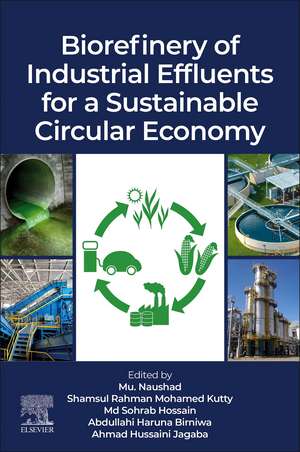Biorefinery of Industrial Effluents for a Sustainable Circular Economy
Editat de Mu. Naushad, Shamsul Rahman Mohamed Kutty, Sohrab Hossain, Abdullahi Haruna Birniwa, Ahmad Hussaini Jagabaen Limba Engleză Paperback – 27 noi 2024
Materials that can be produced from IEB and the treatment processes for such are considered.
- Provides industrial effluents' source, characteristics, and treatment
- Assists in designing an optimization strategy for maximizing efficiency of waste treatment and of bioresource utilization in terms of economic, environmental, and social impact
- Explains bio-based product recovery for a bio-based economy
- Discusses advanced processes for simultaneous industrial effluents treatment and the generation of bio-based products of sufficient value
Preț: 669.92 lei
Preț vechi: 877.33 lei
-24% Nou
Puncte Express: 1005
Preț estimativ în valută:
128.19€ • 133.84$ • 106.09£
128.19€ • 133.84$ • 106.09£
Carte tipărită la comandă
Livrare economică 29 martie-12 aprilie
Preluare comenzi: 021 569.72.76
Specificații
ISBN-13: 9780443218019
ISBN-10: 0443218013
Pagini: 300
Dimensiuni: 216 x 276 mm
Greutate: 0.45 kg
Editura: ELSEVIER SCIENCE
ISBN-10: 0443218013
Pagini: 300
Dimensiuni: 216 x 276 mm
Greutate: 0.45 kg
Editura: ELSEVIER SCIENCE
Cuprins
1. Sources, generation, and properties of industrial effluents for utilization in a biorefinery
2. Environmental impact and management of industrial effluents
3. Cleaner and sustainable circular economy approaches for bio-based product recovery from industrial effluents in a biorefinery
4. Agro-industrial effluents: generation, characteristics, impacts, and applications for bio-based product recovery in a biorefinery
5. Food industrial effluents: generation, characteristics, impacts and applications for bio-based product recovery in a biorefinery
6. Algae-based industrial effluents: generation, characteristics, impacts and applications for bio-based product recovery in a biorefinery
7. Municipal effluents: generation, characteristics, impacts, and applications for bio-based product recovery in a biorefinery
8. Aquaculture industrial effluents: Generation, characteristics, impacts, and applications for bio-based product recovery in a biorefinery
9. Palm oil mill effluents: generation, characteristics, impacts and applications for bio-based product recovery in a biorefinery
10. Recent trends in pulp and paper effluents based biorefinery for bioenergy and value-added products formation
11. Sugarcane industry effluents: generation, characteristics, impacts and applications for bio-based product recovery in a biorefinery
12. Sources, properties, and sustainable valorization technologies of agro-industrial effluents for bioproducts recovery in a biorefinery
13. Microalgal and cyanobacterial strains for nutrients recovery and bio-based products synthesis from agro-industrial effluent
14. Physico-chemical processes for industrial effluents treatment in a biorefinery
15. Role of membrane science in the sustainable development of an algal based biorefinery for industrial effluents treatment
16. Biorefinery waste-based nanocomposites for industrial effluents treatment using physicochemical techniques
17. Biological processes for industrial effluent treatment in a biorefinery
18. Recent advances in the sustainable application of biomass-based cellulose nanocrystals for industrial effluents treatment and resource recovery in biorefineries- Modelling and Optimization
19. Recent progress in the application of hybrid processes for industrial effluents treatment in biorefineries
20. Techno-economic and life-cycle assessment of industrial effluents treatment in biorefineries
21. Valorization glycerol produced as a by-product in the biodiesel industry: An insight into technical and economic studies
22. Ecological impact assessment of hazardous components of industrial effluents and their sustainable management obeying the principle of circular economy: An in-depth view
23. Current policy and regulatory challenges, opportunities, and future perspectives of industrial effluents treatment in biorefineries
24. Native microalgae consortia: a potential contribution to a biorefinery based on liquid circular inputs
25. Comparative Study of Industrial Effluents for Biorefinery Conversion
2. Environmental impact and management of industrial effluents
3. Cleaner and sustainable circular economy approaches for bio-based product recovery from industrial effluents in a biorefinery
4. Agro-industrial effluents: generation, characteristics, impacts, and applications for bio-based product recovery in a biorefinery
5. Food industrial effluents: generation, characteristics, impacts and applications for bio-based product recovery in a biorefinery
6. Algae-based industrial effluents: generation, characteristics, impacts and applications for bio-based product recovery in a biorefinery
7. Municipal effluents: generation, characteristics, impacts, and applications for bio-based product recovery in a biorefinery
8. Aquaculture industrial effluents: Generation, characteristics, impacts, and applications for bio-based product recovery in a biorefinery
9. Palm oil mill effluents: generation, characteristics, impacts and applications for bio-based product recovery in a biorefinery
10. Recent trends in pulp and paper effluents based biorefinery for bioenergy and value-added products formation
11. Sugarcane industry effluents: generation, characteristics, impacts and applications for bio-based product recovery in a biorefinery
12. Sources, properties, and sustainable valorization technologies of agro-industrial effluents for bioproducts recovery in a biorefinery
13. Microalgal and cyanobacterial strains for nutrients recovery and bio-based products synthesis from agro-industrial effluent
14. Physico-chemical processes for industrial effluents treatment in a biorefinery
15. Role of membrane science in the sustainable development of an algal based biorefinery for industrial effluents treatment
16. Biorefinery waste-based nanocomposites for industrial effluents treatment using physicochemical techniques
17. Biological processes for industrial effluent treatment in a biorefinery
18. Recent advances in the sustainable application of biomass-based cellulose nanocrystals for industrial effluents treatment and resource recovery in biorefineries- Modelling and Optimization
19. Recent progress in the application of hybrid processes for industrial effluents treatment in biorefineries
20. Techno-economic and life-cycle assessment of industrial effluents treatment in biorefineries
21. Valorization glycerol produced as a by-product in the biodiesel industry: An insight into technical and economic studies
22. Ecological impact assessment of hazardous components of industrial effluents and their sustainable management obeying the principle of circular economy: An in-depth view
23. Current policy and regulatory challenges, opportunities, and future perspectives of industrial effluents treatment in biorefineries
24. Native microalgae consortia: a potential contribution to a biorefinery based on liquid circular inputs
25. Comparative Study of Industrial Effluents for Biorefinery Conversion
